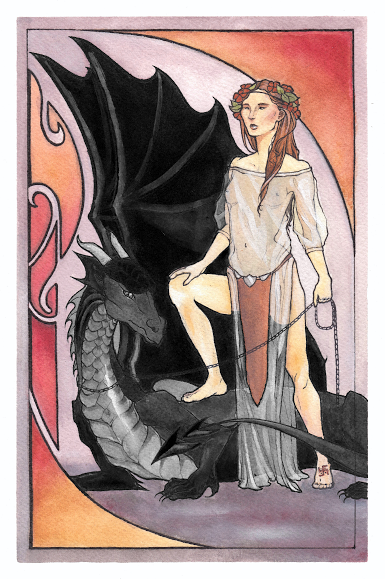<dl><dt class="highlight">fetish (n.)  </dt><dd class="highlight">"material object regarded with awe as having mysterious powers or being the representative of a deity that may be worshipped through it," 1610s, fatisso, from Portuguese feitiço "charm, sorcery, allurement," noun use of an adjective meaning "artificial."
</dt><dd class="highlight">"material object regarded with awe as having mysterious powers or being the representative of a deity that may be worshipped through it," 1610s, fatisso, from Portuguese feitiço "charm, sorcery, allurement," noun use of an adjective meaning "artificial."
The Portuguese adjective is from Latin facticius "made by art, artificial," from facere "to make, do, produce, etc." (see factitious, and compare Frenchfactice "artificial," restored from Old French faitise, from Latin facticius). Via the French word, Middle English had fetis, fetice (adj.) "cleverly made, neat, elegant" (of things), "handsome, pretty, neat" (of persons). But in the Middle Ages the Romanic derivatives of the word took on magical senses; compare Portuguese feiticeria "sorcery, witchcraft," feiticeiro "sorcerer, wizard." Latin facticius in Spanish has become hechizo "artificial, imitated," also "bewitchment, fascination."
The specific Portuguese use of the word that brought it to English probably began among Portuguese sailors and traders who used the word as a name for charms and talismans worshipped by the inhabitants of the Guinea coast of Africa. It was picked up and popularized in anthropology by Charles de Brosses'"Du culte des dieux fétiches" (1760), which influenced the word's spelling in English (French fétiche also is borrowed 18c. from the Portuguese word). </dt><dd>1801, "worship of fetishes," from fetish + -ism. Expanded in use by Comte taking it to denote a general type of primitive religion (animism). In the purely psycho-sexual sense, first recorded 1897 in writings of Henry Havelock Ellis (1859-1939).
</dt><dd>1801, "worship of fetishes," from fetish + -ism. Expanded in use by Comte taking it to denote a general type of primitive religion (animism). In the purely psycho-sexual sense, first recorded 1897 in writings of Henry Havelock Ellis (1859-1939).  </dt><dd class="highlight">female water spirit, 1821, from Modern Latin Undina (1650s), coined by Paracelsus ("De Nymphis") in his alchemical system, from Latin unda "a wave, billow" (see water (n.1)). Popularized by German romance "Undine, eine Erzählung" (1811) by Baron F.H.C. La Motte Fouqué. Undinism (1928) was coined by sex researcher Havelock Ellis to describe the fetish for urine (which Ellis had); nowadays it would be called urophilia.</dd><dt>voodoo (n.)
</dt><dd class="highlight">female water spirit, 1821, from Modern Latin Undina (1650s), coined by Paracelsus ("De Nymphis") in his alchemical system, from Latin unda "a wave, billow" (see water (n.1)). Popularized by German romance "Undine, eine Erzählung" (1811) by Baron F.H.C. La Motte Fouqué. Undinism (1928) was coined by sex researcher Havelock Ellis to describe the fetish for urine (which Ellis had); nowadays it would be called urophilia.</dd><dt>voodoo (n.)  </dt><dd>religious witchcraft of Haiti and Southern U.S., ultimately of African origin, 1850, from Louisiana French voudou, from a West African language (such as Ewe and Fon vodu "spirit, demon, deity," also Vandoo, supposedly the name of an African deity, from a language of Dahomey). Compare vodun "fetish connected with snake worship in Dahomey," said to be from vo "to be afraid," or vo "harmful." The verb is attested from 1880.</dd><dt class="highlight">zombie (n.)
</dt><dd>religious witchcraft of Haiti and Southern U.S., ultimately of African origin, 1850, from Louisiana French voudou, from a West African language (such as Ewe and Fon vodu "spirit, demon, deity," also Vandoo, supposedly the name of an African deity, from a language of Dahomey). Compare vodun "fetish connected with snake worship in Dahomey," said to be from vo "to be afraid," or vo "harmful." The verb is attested from 1880.</dd><dt class="highlight">zombie (n.)  </dt><dd class="highlight">1871, of West African origin (compare Kikongo zumbi "fetish;" Kimbundu nzambi "god"), originally the name of a snake god, later with meaning "reanimated corpse" in voodoo cult. But perhaps also from Louisiana creole word meaning "phantom, ghost," from Spanish sombra "shade, ghost." Sense "slow-witted person" is recorded from 1936.</dd><dt>mascot (n.)
</dt><dd class="highlight">1871, of West African origin (compare Kikongo zumbi "fetish;" Kimbundu nzambi "god"), originally the name of a snake god, later with meaning "reanimated corpse" in voodoo cult. But perhaps also from Louisiana creole word meaning "phantom, ghost," from Spanish sombra "shade, ghost." Sense "slow-witted person" is recorded from 1936.</dd><dt>mascot (n.)  </dt><dd>"talisman, charm," 1881, from provincial French mascotte "sorcerer's charm, 'faerie friend,' good luck piece" (19c.), of uncertain origin, perhaps from or related to Provençal mascoto "sorcery, fetish" (a Narbonnese manuscript of 1233 has mascotto "procuress, enchantment, bewitchment in gambling"), frommasco "witch," from Old Provençal masca, itself of unknown origin, perhaps from Medieval Latin masca "mask, specter, nightmare" (see mask (n.)). Popularized by French composer Edmond Audran's 1880 comic operetta "La Mascotte," about a household "fairy" who gives luck to an Italian peasant, performed in a toned-down translation in England from fall 1881.</dd><dt class="highlight">kink (n.)
</dt><dd>"talisman, charm," 1881, from provincial French mascotte "sorcerer's charm, 'faerie friend,' good luck piece" (19c.), of uncertain origin, perhaps from or related to Provençal mascoto "sorcery, fetish" (a Narbonnese manuscript of 1233 has mascotto "procuress, enchantment, bewitchment in gambling"), frommasco "witch," from Old Provençal masca, itself of unknown origin, perhaps from Medieval Latin masca "mask, specter, nightmare" (see mask (n.)). Popularized by French composer Edmond Audran's 1880 comic operetta "La Mascotte," about a household "fairy" who gives luck to an Italian peasant, performed in a toned-down translation in England from fall 1881.</dd><dt class="highlight">kink (n.)  </dt><dd class="highlight">1670s, "knot-like contraction or short twist in a rope, thread, hair, etc., originally a nautical term, from Dutch kink "twist in a rope" (also found in French and Swedish), which is probably related to Old Norse kikna "to bend backwards, sink at the knees" as if under a burden (see kick (v.)). Figurative sense of "odd notion, mental twist, whim" first recorded in American English, 1803, in writings of Thomas Jefferson; specifically "a sexual perversion, fetish, paraphilia" is by 1973 (by 1965 as "sexually abnormal person").</dd><dt>vice (n.1)
</dt><dd class="highlight">1670s, "knot-like contraction or short twist in a rope, thread, hair, etc., originally a nautical term, from Dutch kink "twist in a rope" (also found in French and Swedish), which is probably related to Old Norse kikna "to bend backwards, sink at the knees" as if under a burden (see kick (v.)). Figurative sense of "odd notion, mental twist, whim" first recorded in American English, 1803, in writings of Thomas Jefferson; specifically "a sexual perversion, fetish, paraphilia" is by 1973 (by 1965 as "sexually abnormal person").</dd><dt>vice (n.1)  </dt><dd>"moral fault, wickedness," c. 1300, from Old French vice "fault, failing, defect, irregularity, misdemeanor" (12c.), from Latin vitium "defect, offense, blemish, imperfection," in both physical and moral senses (in Medieval Latin also vicium; source also of Italian vezzo "usage, entertainment"), from PIE *wi-tio-, from root *wei- (3) "vice, fault, guilt."
</dt><dd>"moral fault, wickedness," c. 1300, from Old French vice "fault, failing, defect, irregularity, misdemeanor" (12c.), from Latin vitium "defect, offense, blemish, imperfection," in both physical and moral senses (in Medieval Latin also vicium; source also of Italian vezzo "usage, entertainment"), from PIE *wi-tio-, from root *wei- (3) "vice, fault, guilt."
The Portuguese adjective is from Latin facticius "made by art, artificial," from facere "to make, do, produce, etc." (see factitious, and compare Frenchfactice "artificial," restored from Old French faitise, from Latin facticius). Via the French word, Middle English had fetis, fetice (adj.) "cleverly made, neat, elegant" (of things), "handsome, pretty, neat" (of persons). But in the Middle Ages the Romanic derivatives of the word took on magical senses; compare Portuguese feiticeria "sorcery, witchcraft," feiticeiro "sorcerer, wizard." Latin facticius in Spanish has become hechizo "artificial, imitated," also "bewitchment, fascination."
The specific Portuguese use of the word that brought it to English probably began among Portuguese sailors and traders who used the word as a name for charms and talismans worshipped by the inhabitants of the Guinea coast of Africa. It was picked up and popularized in anthropology by Charles de Brosses'"Du culte des dieux fétiches" (1760), which influenced the word's spelling in English (French fétiche also is borrowed 18c. from the Portuguese word).
Any material image of a religious idea is an idol; a material object in which force is supposed to be concentrated is a Fetish; a material object, or a class of material objects, plants, or animals, which is regarded by man with superstitious respect, and between whom and man there is supposed to exist an invisible but effective force, is a Totem. [J. Fitzgerald Lee, "The Greater Exodus," London, 1903]Figurative sense of "something irrationally revered, object of blind devotion" appears to be an extension made by the New England Transcendentalists (1837). For sexual sense (1897), see fetishism.</dd><dt>fetishism (n.)
In certain perversions of the sexual instinct, the person, part of the body, or particular object belonging to the person by whom the impulse is excited, is called the fetish of the patient. [E. Morselli in "Baldwin Dictionary of Philosophy," 1901]Related: Fetishist (1845; psycho-sexual sense from 1897); fetishistic.</dd><dt class="highlight">undine (n.)
Horace and Aristotle have already spoken to us about the virtues of their forefathers and the vices of their own times, and through the centuries, authors have talked the same way. If all this were true, we would be bears today. [Montesquieu]Vice squad "special police unit targeting prostitution, narcotics, gambling, etc.," is attested from 1905, American English. Vice anglais "fetish for corporal punishment," literally "the English vice," is attested from 1942, from French. In Old French, the seven deadly sins were les set vices.</dd></dl>




